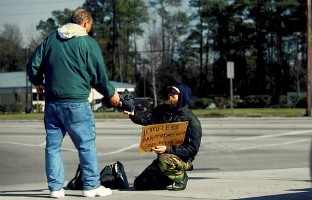Charity vs. politics?

Marilyn Sewell raises a familiar subject:
Churches almost always prefer charity to justice. Let's take, for example, the question of hunger. Churches find it easier to open a soup kitchen, rather than lobby politicians or put pressure on government to feed hungry people or help them get jobs. . . . What's wrong with this picture? To effect change, churches must move beyond charity to justice, changing the economic and political systems that keep people impoverished.
Along with the fact that charity is simply easier, Sewell names three additional reasons churches often avoid pursuing justice:
- Charity is less controversial than politics.
- People fear that political advocacy will threaten a church's tax-exempt status. (It won't, unless they're endorsing candidates.)
- Politics strikes some people as too worldly a pursuit for the church.
I'd add a fourth: charity often produces immediate, concrete results. It's more satisfying to give a hungry person a healthful meal than it is to move the ball an inch forward in the fight for better food policy--especially for people who are new to advocacy work and not hardened to its realities.
More importantly: All of these explanations take as given that working for justice means working in the realm of politics. Certainly this is often the case. But Sewell seems to be conflating the charity vs. justice binary with another one: direct service vs. advocacy. The two subjects are intricately related, but they're not the same thing.
Sewell is right that charity is often just "a Band-Aid" that primarily "allows donors to feel good," but this applies not only to individuals and churches but also to nations, whose aid efforts might have political support but aren't always helpful. On the other hand, the direct-service efforts that so many churches excel at don't always amount to just handouts and Band-Aids. Teaching 20 immigrants to speak English might not effect large-scale systemic change, but its impact on those 20 people is deep, permanent and empowering. Doesn't that count as justice work?
None of which is to say that it's enough to get churches to move from just giving people a fish to teaching them to fish as well. We also need the grueling, abstract work of advocacy--to prevent polluters from killing all the fish in the river, to stock the river when this fails, to subsidize child care so people can get away long enough to catch anything. Sewell is right that it's difficult but important to get churches involved with all this. The options for churches, however, are more complex than Band-Aids on the one hand and politics on the other.





